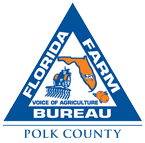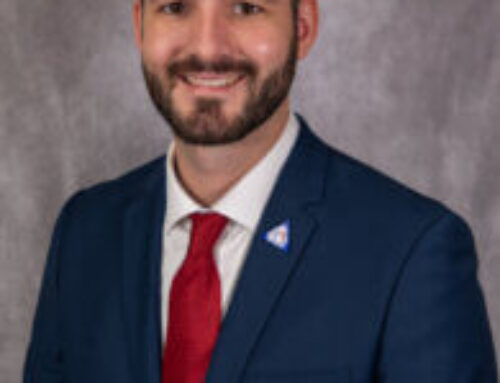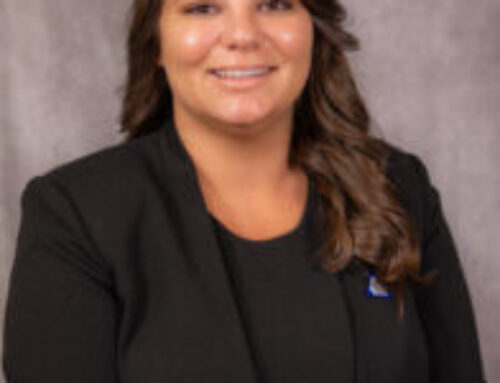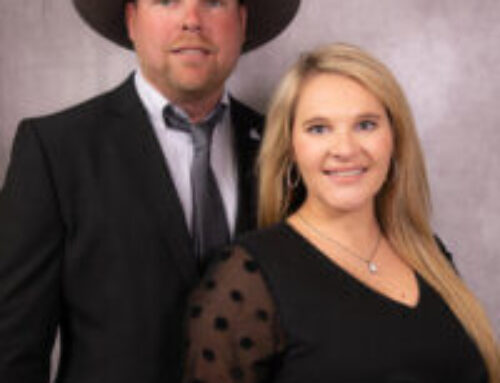Service in a Time of Need
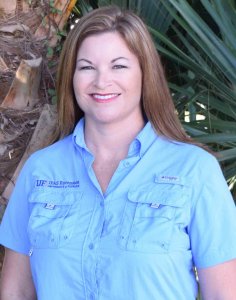
 UF/IFAS Extension dairy agent Colleen Larson
UF/IFAS Extension dairy agent Colleen Larson
didn’t wait for instructions on how to help farmers in the wake of Hurricane Irma. She bought sandwiches at a sub shop and delivered them to essential workers. Then she went to her kitchen, cooked her own food and delivered it.
A prominent Farm Bureau family helped her develop this instinct. A critical part of her education occurred in the kitchen of her grandmother-in-law, Reda Larson. When the hurricanes of 2004 hit, Reda’s example taught Colleen that when disaster strikes, figure out what you can do to serve. And that you can start by serving food.
Colleen had recently married into the legendary Larson dairy family and its generations of Farm Bureau leaders that hurricane season. Her husband, Travis Larson, is president of the Okeechobee County Farm Bureau. Her brother-in-law, Jacob, is a Farm Bureau state board member. Her grandfather-in-law Red is a Florida Ag Hall of Famer and longtime Farm Bureau member. Her father-in-law Woody, is a former Okeechobee County Farm Bureau president. Woody’s brother, John, also served on the board.
In 2004, the Larson matriarch, Reda, had turned the Larson Dairy office kitchen into the food service for workers who couldn’t get home during extra-long shifts or who couldn’t get hot meals during a power outage.
Reda passed in 2014, so when Irma hit, Colleen took the lead, baking ham and putting together platters to keep the workers fed.
She also hosted daily meetings at the UF/IFAS Extension Okeechobee County office to map out the deployment of food distribution to hundreds of farm workers across five counties.
She had only last year become a UF/IFAS Extension regional dairy agent, but her long experience in the local dairy business had given her a feel for which farmers and laborers would need the most immediate aid.
She also knew from her family history how much the Farm Bureau could contribute to such a team. So she wasn’t surprised to see Farm Bureau field rep Tom Hill show up at one of those morning meetings. He didn’t wait for instructions either.
For five days, Colleen and a team that included Hill, her Extension co-workers, Florida Department of Agriculture and Consumer Services employees and community volunteers received food from FEMA and relief organizations and shuttled it to the families of workers.
Hill and Okeechobee County Extension Director Lauren Butler (who also married into a Farm Bureau family — her husband and brother-in-law are on the county board) loaded Hill’s pickup and an SUV. Hill and Butler rolled to dairies in Sebring and Lorida. Colleen ditched her work vehicle and loaded her F-150 instead because it had the four-wheel drive she knew she’d need on muddy farm roads.
Her cell phone buzzed with text messages from the communications network she had set up before the storm so those in need could reach those who could help.
There are two things typical about Colleen’s story. One is that it exemplifies the work UF/IFAS Extension agents did all over the state to help farmers tend to their people, their animals, and their crops after the disaster.
The second is that she did it in partnership with the Farm Bureau. There are Tom Hills all over the state, too. So in every disaster Colleen may have to figure out anew how to serve, but she won’t have to figure out whom to serve.
Jack Payne is the University of Florida’s senior vice president for agriculture and natural resources and leader of the Institute of Food and Agricultural Sciences.
